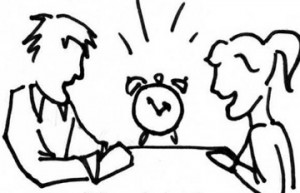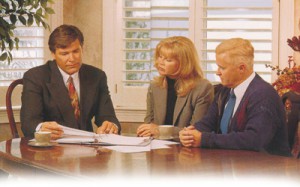
Comparing the day to day responsibilities of a funeral director with the process of speed dating is like matching apples and oranges. Speed dating is a pleasure activity to meet new people and consider potential mates while serving as a funeral director involves addressing families about the deaths of their loved ones, planning services and arranging burial or cremation plans. However, in peeling the layers away to reveal the framework of the basic human interactions utilized in each form of communication, the similarities begin to emerge. Even solely in the realm of learning to read individuals, adapt to a situation and draw conclusions in a short period of time, there is much a funeral director can learn from the process of speed dating.

For most people arranging for a funeral is a strange or foreign concept. Speed dating is a strange concept in itself but one some people find necessary to meet prospective dates. In speed dating, an individual registers for a group event and is given generally ten minutes or less to interact with everyone of the opposite gender at the event. At the conclusion of the event, participants reveal which of their potential partners they are interested in to the moderator or organizer and, should both parties feel the same, individual contact information is provided. Although controversial in execution due to the limitations of a small time frame, speed dating can be an effective way of meeting a pool of eligible potential dates in a prearranged event in several hours, providing extensive networking and relationship possibilities.
Funeral directors have a radically different host of responsibilities. The job of a funeral director also requires brief meetings with the families of a deceased or the representative of a deceased’s estate to organize funeral services, calling hours, burial or cremation services and provide obituary services if needed. While speed dating is an elective process, individuals who enlist the services of a funeral director generally only do so out of necessity. The subject of death and the accompanying emotions can be overwhelming, adding a layer of complexity to the interactions funeral directors have with clients.
Although on the surface there seems to be little in the way of similarities, the skills speed daters need to develop to succeed actually quite similar to the skill set that makes for an effective funeral director. In speed dating, a participant only has several minutes to decide whether or not a possible partner is worth pursuing. Studies show that many decide in the first ten seconds if the person has a chance at a date. Hopefully they will give the funeral directors more the ten seconds, but the point is we need to make a positive impression very quickly. In this time, evaluating your partner, responding accordingly, interpreting emotions and reactions and understanding whether a future interaction could have potential are crucial to success. Without being able to read the other person’s body language, facial cues, vocal inflection and other subtle indicators of mood or reaction, a worthwhile opportunity could be easily overlooked. As important as learning how to comprehend another individual’s subtleties can be in speed dating, learning how to convey your own emotions can be just as important. In order to attract someone’s attention, expressing your interest and feelings of connectivity can be essential. Mastering speed dating can take a high level of social grace, intuition and comprehension of human emotion.
In the same ways that speed dating can require a more highly adapted approach to human interactions, working as a funeral director takes a similar set of abilities. The time a funeral director has with a client to ascertain needs, wants and emotions is not much longer than a speed dating encounter. In order to provide a high level of service in an industry that works with death and its impact on friends and loved ones, a funeral director must be able to read body language and act on social cues to make a difficult conversation as easy as possible. When it comes to handling a deceased’s affairs, many family members or representatives may not be able to fully understand the many options available to them. This is why it’s so important that the funeral director make an almost instant connection. Much in the same way a speed dater must read and react to a potential partner in order to establish a connection, a funeral director must read and react to a client to make sure all bases are covered in a satisfactory manner. If no connection is made the family is not likely to want to hear or care about the options and suggestions made by the funeral director.
In both fields, being able to properly convey your own emotions to another human being is essential. In speed dating, this serves to create a bond or connection while a funeral director must properly use empathy and kindness to demonstrate trustworthiness to a customer so that he or she knows the deceased will be in good hands. The trust between a funeral director and client is central to making sure the right services are offered and proper options made available. Funeral planning funeral, cremation services and obituaries can be very personal and emotional situations to handle and being able to create a quick connection is very important to establishing a working relationship. This same concept applies in bonding with a possible partner. Like in speed dating, a funeral director only has one chance and one small time window to make sure everything is right.
 Serving as a funeral director can be a very emotional and stressful job due to its proximity to death. Funeral directors are called upon in painful times and only have a brief period with a customer to build trust, convey empathy and assure an individual his or her deceased loved one will be treated with dignity, care and respect. These skills are very similar to the quick connection one must build to succeed in speed dating. Reading body language, interpreting social cues and using emotion to build a rapport with an individual are skills frequently used in both areas. By treating each encounter with a client as a speed dating opportunity, funeral directors may be able to improve the levels on which they connect with their customers in order to instill trust and create a bond demonstrative of a high level of service.
Serving as a funeral director can be a very emotional and stressful job due to its proximity to death. Funeral directors are called upon in painful times and only have a brief period with a customer to build trust, convey empathy and assure an individual his or her deceased loved one will be treated with dignity, care and respect. These skills are very similar to the quick connection one must build to succeed in speed dating. Reading body language, interpreting social cues and using emotion to build a rapport with an individual are skills frequently used in both areas. By treating each encounter with a client as a speed dating opportunity, funeral directors may be able to improve the levels on which they connect with their customers in order to instill trust and create a bond demonstrative of a high level of service.
Join The Author Jeff Staab On Google Plus
Like him on Face Book HERE
Connect on LinkedIn www.linkedin.com/in/jeffstaab

